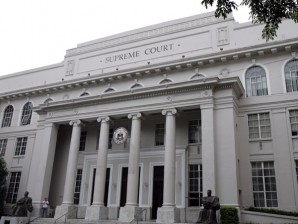MANILA, Philippines—A businessman has asked the Supreme Court to order the Commission on Elections (Comelec) to enforce the constitutional ban on political dynasties in the coming national and local polls.
In a 24-page petition, Louis Biraogo lamented how dynasties still dominate the country’s political landscape, adding that the current batch of candidates for 2013 was the “best testament to that political and constitutional mockery.”
“The refusal of the government, the Congress in particular, to fulfill the constitutional prohibition against political dynasties has been a continuing insult to the Filipino people. Something must be done about this anomaly,” Biraogo said.
“If the political branches of the government will not act on this baneful problem, then the citizenry must act and seek appropriate judicial relief from the court of last resort pursuant to the principle of ubi jus ibi remedium—where there is a right, there is a remedy,” he added.
According to Biraogo, political dynasties have long dominated Philippine politics. “Patronage politics became the rule in the polls,” he said, adding that “one who did not belong to a political dynasty had no chance of winNing against a member of a politically powerful and influential family.”
“Under this system, public power remained in the hands of the political dynasties. It also meant that the interests of the political dynasties prevailed over the national interest,” he said.
But an antidynasty provision was included in the 1987 Constitution. Section 26, Article II states: “The state shall guarantee equal access to opportunities for public service, and prohibit political dynasties as may be defined by law.”
“Whether or not political dynasties are evil per se is no longer debatable from a constitutional perspective. Sec. 26, Art. II of the 1987 Constitution prohibits political dynasties, period. Thus, whether a political dynasty is reform-oriented, or is known for public service, does not really matter. Political dynasties are prohibited by the fundamental law of the land,” Biraogo argued.
“Evidently, the prohibition against political dynasties is the means by which the guarantee of equal access to opportunities for public power is to be fulfilled,” he said.
Biraogo mentioned candidates in the forthcoming election who belong to political dynasties: senatorial aspirants Bam Aquino and Margarita Cojuangco, cousin and aunt of President Aquino; the children of Vice President Binay—Nancy, Abigail and Erwin—who are running for senator, congressman and Makati City mayor, respectively; and the family of former President and Manila mayoral bet Joseph Estrada, who has seven relatives running for various positions next year.
The petitioner also cited the Magsaysays, Cayetanos, Villars, Angaras, Revillas, Belmontes, Pacquiaos and Jalosjoses, whose members currently occupy government posts or are running for other positions next year.
Biraogo contended that while Congress has not yet passed a law defining the term “political dynasties,” the Comelec is vested with implied powers to make a definition and the “ministerial duty” to prohibit dynasties.
“Twenty-five years has been too long a waiting period. Another 25 years will be too much to bear. It is time to put an end to the continuing insult visited upon the Filipino people by the inexcusable and adamant refusal of the Congress to enact legislation for the full enjoyment by the people of a guaranteed state policy,” Biraogo said.
